1. Pack Light, But Smart
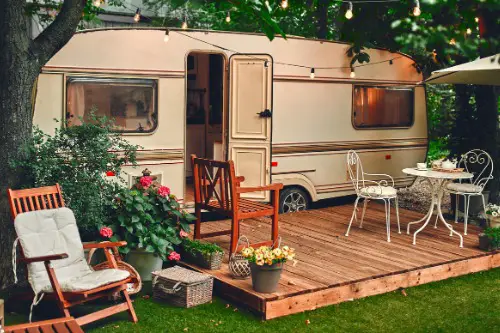
When you’re traveling in an RV, space is precious. Unlike staying in a hotel or renting an apartment, your home on wheels doesn’t come with endless storage options. So, one of the first hacks is to pack light, but smart. Focus on versatility and practicality when it comes to your clothes and gear. Opt for multi-functional items, like a jacket that doubles as a pillow or a blanket that can also be a towel. It’s all about reducing bulk while ensuring you have what you need.
Additionally, make use of storage space wherever possible. Utilize under-bed storage or hanging organizers in closets to keep things tidy. Another great hack is to use small, stackable storage bins that can be easily moved around. This way, you’re not constantly searching for things, and everything has a designated spot. By organizing and packing carefully, you’ll find that you can have a more comfortable and efficient trip without feeling cramped.
2. Invest in a Portable Water Filter

Fresh water is essential, especially when you’re out in remote areas where water sources might be questionable. An RV water filter system is a must-have to ensure you’re drinking and cooking with clean, filtered water. There are many portable water filters on the market that are easy to install and can be hooked up directly to your RV’s water supply. This small investment can save you from running into problems with contaminated water, which can lead to illness.
Another great reason to carry a portable water filter is for filtering water from rivers or lakes during off-grid adventures. If you plan to do some boondocking (camping without hookups), a filter will help ensure the water you get from natural sources is drinkable. Even when staying at campsites, it’s good to have an extra layer of protection in case the campsite water isn’t as clean as it seems. It’s one less worry you’ll need on the road.
3. Bring Extra Toilet Paper and Wipes
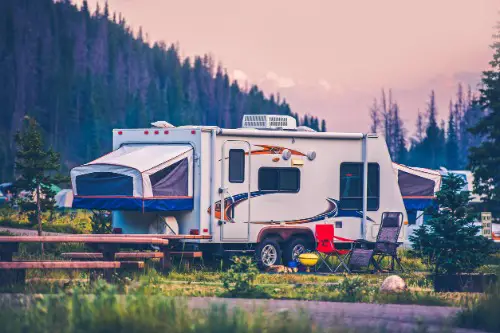
While RVs are equipped with toilets, they don’t always have the same capacity as a full-sized bathroom, and you don’t want to run out of essentials like toilet paper. It’s a good idea to stock up before heading out. Bring a few extra rolls and be sure they’re RV-safe (non-scented, septic-friendly brands are best). You don’t want to clog the system with non-degradable paper.
In addition to toilet paper, keep a stash of wet wipes on hand. These are incredibly helpful for cleaning your hands after handling waste or when you’re in a pinch and don’t have access to water. Wipes are versatile – use them to clean up spills, wipe down surfaces, or freshen up when you don’t have time for a full shower. A few extra packs can go a long way in maintaining hygiene and comfort during your journey.
4. Use RV-Level Surge Protectors
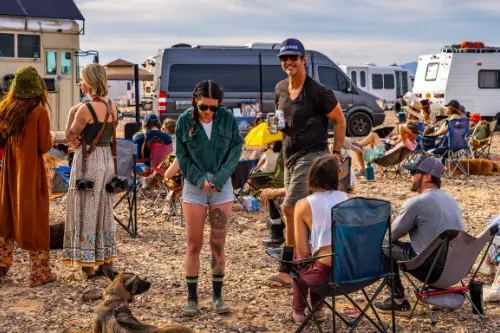
When you’re connected to electrical outlets at campsites, using an RV-level surge protector is a must. These devices help safeguard your RV’s electrical system from power surges that can occur due to storms or issues at the campground. Without surge protection, a power surge could fry your RV’s expensive electronics and appliances, costing you a significant amount of money to repair or replace them.
It’s also a good idea to test the electrical system at the campsite before fully connecting. A surge protector can alert you to faulty wiring or insufficient power, allowing you to address any issues before they become bigger problems. This hack is one of the easiest and most cost-effective ways to protect your RV’s electrical system and ensure your trip stays hassle-free.
5. Use Command Hooks for Extra Storage

Maximize your RV’s interior space with Command hooks. These small, adhesive hooks can be used almost anywhere – on walls, doors, or cabinets – without damaging the surface. They are perfect for hanging everything from hats and jackets to kitchen tools and bags. This allows you to keep things organized and accessible, without having to worry about losing things in cluttered drawers or cupboards.
Command hooks are especially handy for creating additional storage in places that wouldn’t traditionally have them. For example, you can install hooks behind cabinet doors to store towels, or in your entryway to hold bags or dog leashes. The flexibility they offer is a game-changer, and you can reposition them as needed when you need more space or a change of scenery.
6. Use Solar Power to Charge Devices
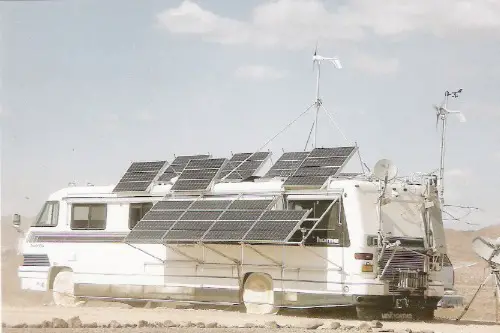
RVing in the great outdoors means you may not always have access to electrical hookups, but with solar panels, you can solve that problem. Investing in a portable solar power system is one of the best ways to ensure that you can still charge devices like your phone, tablet, or even a laptop, without relying on campground electricity. It’s environmentally friendly and can help reduce your overall energy consumption.
Most solar panels are lightweight and compact, making them easy to transport and set up when needed. While these systems can’t power your entire RV, they can be used to keep small devices running, which is crucial during long stretches of off-grid camping. Solar chargers are a great way to stay connected and keep your essential electronics working without the worry of running out of power.
7. Keep a First-Aid Kit Handy
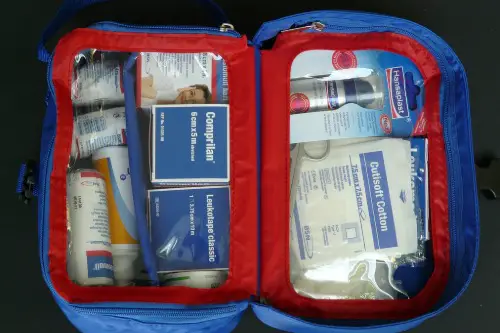
It’s easy to overlook a first-aid kit when you’re preparing for an RV trip, but it’s an absolute necessity. You never know when a minor injury might happen, whether it’s a cut from a kitchen knife, a sprained ankle from a hike, or something more serious. A well-stocked first-aid kit will have everything you need for quick and easy care, including bandages, antiseptic, pain relievers, and even specialized items like burn cream or an emergency whistle.
Beyond the basics, consider adding items specific to your needs, like any medications you regularly take or items required for chronic conditions (like an inhaler or an EpiPen). It’s always better to be prepared for the unexpected. Having a first-aid kit on hand gives you peace of mind knowing that you can handle small medical emergencies while on the road.
8. Use Collapsible Kitchenware
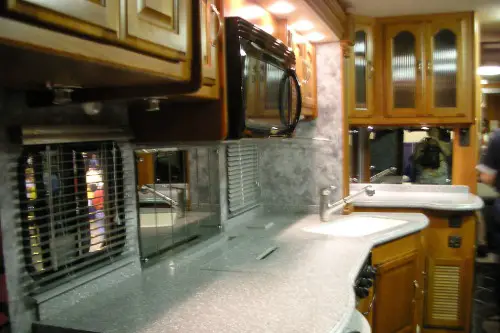
When it comes to cooking in your RV, saving space is key. One hack that can help is using collapsible kitchenware, like bowls, measuring cups, and even storage containers. These items can be flattened down to take up significantly less room when not in use, which frees up space for other things you need in your RV. This is especially important in kitchens with limited counter space.
You can also find collapsible pots and pans, which allow you to store them easily while still maintaining their usefulness when it’s time to cook. These space-saving solutions are invaluable for keeping your kitchen organized and functional, helping you prepare meals without sacrificing storage space for your other essentials.
9. Keep Your RV Organized With Magnetic Spice Jars
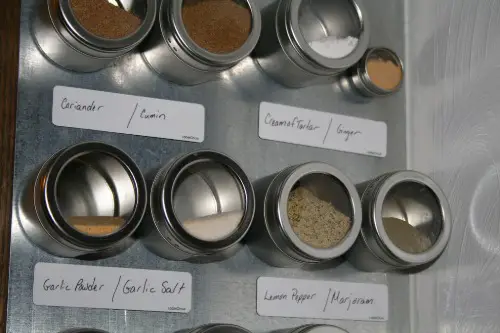
When you’re cooking in an RV, having your spices organized can make a big difference. Magnetic spice jars are an easy and efficient way to keep your spices in order while saving precious cabinet space. You can attach them to the side of the fridge or other metal surfaces, making them easily accessible without taking up any drawer or cupboard space.
Not only do they save space, but magnetic spice jars also make it easier to find exactly what you need while cooking. Instead of digging through crowded spice cabinets, you can simply grab what you need and keep cooking. Plus, magnetic jars are less likely to spill or make a mess, which is always a win in the confined space of an RV.
10. Carry Extra Fuses and Light Bulbs
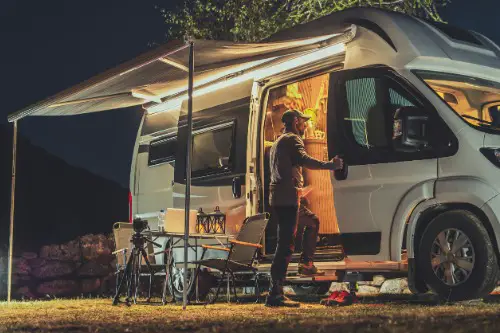
It’s easy to forget the small things when packing for an RV trip, but carrying extra fuses and light bulbs can save you a lot of trouble. Fuses protect your RV’s electrical system from power surges, and if one blows, you’ll need to replace it to continue using certain appliances or lights. It’s a simple fix, but having spares on hand ensures you don’t have to scramble to find replacements while you’re on the road.
Likewise, light bulbs burn out over time, and having extras ensures that you won’t be left in the dark, literally. They don’t take up much space, so it’s worth stashing a few extras in your RV’s storage compartments. This hack helps keep things running smoothly and ensures your RV remains functional during your trip.
11. Install a Towel Bar or Hooks for Drying Wet Gear
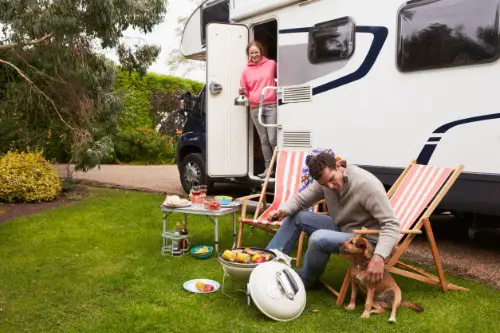
If you’re adventuring outdoors, your gear is likely to get wet. Whether you’re hiking through rain or swimming at the beach, having a way to dry off your gear is crucial. A towel bar or set of hooks installed in your RV’s bathroom or even outside the door is a great way to hang wet clothes, towels, or outdoor equipment. It prevents moisture from building up inside the RV and helps to keep things dry and fresh.
Plus, drying wet gear outdoors or in a well-ventilated space helps prevent mildew, which can quickly become a problem in tight, humid spaces like an RV. A towel bar or hooks is a simple and effective solution that helps maintain the cleanliness and comfort of your RV while making sure you have dry gear ready for your next adventure.
12. Carry a Portable Dumping System
One of the most inconvenient parts of RV travel is dealing with waste management. Most RV parks have dump stations, but if you find yourself boondocking or staying somewhere without a proper facility, having a portable dumping system can be a lifesaver. These systems allow you to safely and hygienically store waste until you can dispose of it properly.
While it’s an extra item to carry, the peace of mind it offers is invaluable. There are compact and easy-to-use options available that make this process simple. Plus, it keeps you from having to find a dump station in an emergency, which can be stressful when you’re deep in nature or off the beaten path.
13. Use a RV-Level Tire Pressure Monitor
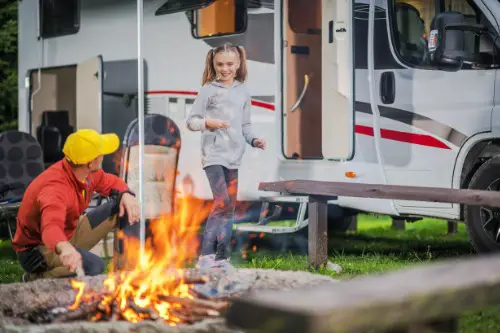
RV tires are heavy-duty, but they still need regular maintenance to stay in good condition. One essential hack is using an RV-level tire pressure monitor. This device allows you to check the pressure of your RV tires quickly and efficiently, ensuring that they are at the proper inflation levels before hitting the road. Overinflated or underinflated tires can wear down quickly and even pose a safety risk.
Keeping an eye on tire pressure is especially important when you’re driving long distances, as tire blowouts can be dangerous. By using a monitor, you’ll extend the life of your tires and have fewer worries on the road. This is a simple, preventative measure that can save you a lot of time, money, and hassle during your trip.
14. Use a Leveling System for Better Stability
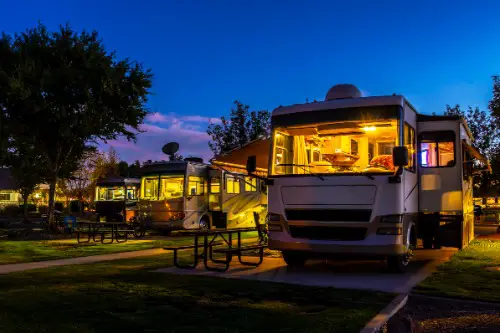
A leveling system is an underrated hack that can make your RV experience much more comfortable. When you park your RV at a campsite, it’s not always perfectly level, and this can cause issues with things like the refrigerator, sleeping comfortably, or simply feeling settled. An automatic leveling system, which can be operated at the push of a button, ensures that your RV is perfectly level and stable.
If you don’t have an automatic system, manual leveling blocks work just as well. Having a solid, level base makes your RV feel more like a true home and helps prevent any discomfort during your stay. Plus, it ensures that appliances like the fridge run more efficiently, which is a key consideration for those planning longer stays.


